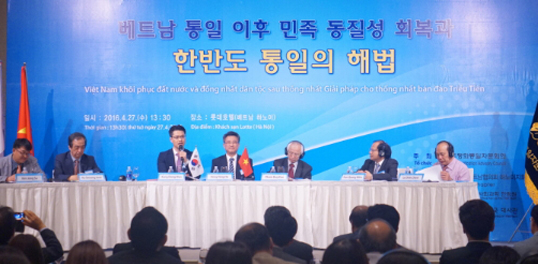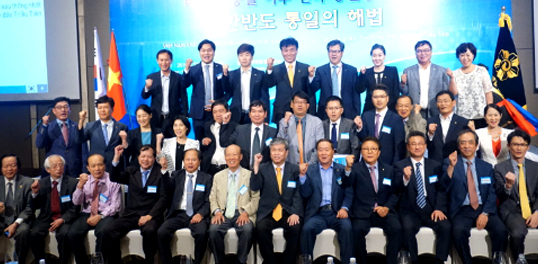2016 Korea·Vietnam Peaceful Reunification Forum held in Hanoi, Vietnam
“Recovery of National Homogeneity after Vietnam's Unification and Solution for Reunification of the Korean Peninsula”
2016 Korea·Vietnam Peaceful Reunification Forum held in Hanoi, Vietnam
The 2016 Korea·Vietnam Peaceful Reunification Forum was held on April 27 at Lotte Hotel, Hanoi, Vietnam for the purpose of drawing tasks in preparation for the reunification of the Korean peninsula based on the situation of Vietnam after its unification and to strengthen cooperative relations between South Korea and Vietnam in the rapidly changing state of affairs in East Asia.
This forum was a resounding success with more than 330 people attending including around 120 from Vietnam such as Nguyen Duy Dung, head of the Institute for Southeast Asian Studies, Cu Chi Loi, head of the American Continent Research Institute, Tran Trong Toan, former ambassador of Vietnam to Korea, high-ranking executives and members of the Vietnam Central Party and Institute of Social Science, local students, Korean residents in Vietnam, and journalists. The topic was “Recovery of National Homogeneity after Vietnam's Unification and Solution for Reunification of the Korean Peninsula.”
The opening ceremony kicked off with an opening speech from Hanoi Provincial Assembly Chief Kim Jeong-in, followed by welcoming remarks from Jun Dae-joo, South Korean ambassador to Vietnam, congratulatory remarks from Bui Nhat Quang, member of the Budget Committee of the Central Party, and Yoo Myeong-sik, head of the Vietnam Municipal Chapter, and keynote address from NUAC Secretary General Bae Jung-ho.
“The histories of division of Vietnam and South Korea have similarities, but the reunification of South Korea is a task that has yet to be accomplished. It is a great opportunity to understand and benchmark how Vietnam overcame the sociocultural change in everyday lives caused by 30 years of division through 40 years of development,” said Hanoi Provincial Assembly Chief Kim Jeong-in during his opening speech.
According to Jun Dae-joo, South Korean ambassador to Vietnam, a unified Korean peninsula will not only bring about stabilization of Northeast Asia but also play the role of a tow truck that will lead to peace and prosperity of the world as a whole. “I look forward to Vietnam becoming a partner, a strategic companion, and a firm advocate for the reunification of the Korean peninsula,” he added, emphasizing the importance of cooperation between South Korea and Vietnam throughout this forum.
In particular, Bui Nhat Quang, a member of the Budget Committee of the Central Party and the vice-chief of the Institute of Social Science who attended this forum, offered his congratulations on the holding of the forum. "This forum will be a great opportunity for scholars of both nations to debate and share ideas constantly as to the meaning and importance of reunification of the Korean peninsula and share the experience of Vietnam bringing together national reconciliation in the socioeconomic aspects," he said.
In his congratulatory remarks, Yoo Myeong-sik, head of the NUAC Vietnam Municipal Chapter, noted that the tension between South and North is getting worse due to North Korea’s nuclear experiments and launch of missiles. “Regarding the recent movements of North Korea, in order to draw practical change of North Korea, formation of an international bond of sympathy and cooperation are essential. I hope that, through this forum, the friendship of South Korea and Vietnam deepens, stepping toward the path of peace and prosperity,” he added.
Meanwhile, in his keynote remarks, Secretary General Bae Jung-ho called for Vietnam's participation in imposing sanctions. “Vietnam's implementation of imposing sanctions against North Korea — considering the fact that Vietnam has been a traditional ally nation of North Korea carrying out exchange in the political, economic, and military fields — can serve as a major turning point for North Korea's attitude change. Active cooperation between South Korea and Vietnam is the utmost priority for United Nations' sanction to be implemented without any loopholes,” he explained.
He added that, in 2014, North Korea and Vietnam carried out investment and trade amounting to $5 million, and North Korean restaurants are operating in Vietnam. Thus, he says, Vietnam's cooperation is required to cut the financial resources of North Korea for the fulfillment of denuclearization of the North.
During the 1st session themed “Vietnam's role in the unification of the Korean peninsula,” former Unification Minister Hong Yang-ho presided over the session. Presentations were given by Dong-A University Professor Kang Dong-wan and Pham Duy Duc, vice-president of the Ho Chi Minh National Politics Institute.

1st Session
According to Dong-A University Professor Kang Dong-wan, who gave a presentation on the “Effect of Korean Wave on North Korea's Society,” the Korean wave is spreading due to the increase in popularity of South Korean movies and dramas within North Korea. He analyzed such phenomena as not only a spread of Korean wave but a medium to expand the market ― which is an element of capitalism ― inside the closed system of North Korea. He also stressed that North Korean civilians watching the media of South Korea, combined with other factors that promote a change of regime in North Korea, may function as a catalyst that can change North Korean society as a whole.
After that, Pham Duy Duc, vice-president of the Ho Chi Minh National Politics Institute, noted that the research on the sociocultural difference of the South and North Vietnam prior to 1975 is not simply about the economic, social, historical traditional, and cultural characteristics, but that the Vietnam War as background caused the difference in contradicting sociocultural policies. He went on to add that the basic difference lies during the period of international state of affairs when the cold war was taking place between socialism and capitalism ideologies, including the difference of the two culture models showing reciprocal resistant characters regarding sociocultural policies related to the two different political systems and political ideas.
In the 2nd session themed “South Korea·Vietnam Cooperation Methods to Stabilize Peace in the Korean Peninsula,” Tran Quang Minh, head of the Institute for Northeast Asian Studies, presided over the session. Presentations were given by Dinh Quang Hai, head of the History Institute, and Lee Young-jong, head of the Center for Unification and Culture of JoongAng Daily.

2nd Session
As the first presenter, Dinh Quang Hai, head of the History Institute, noted that Vietnam, since the unification of South and North took place, pushed from the central part to the provinces a focused, consistent political, cultural, social, and economic integration. “To recover from the wounds of war and for the nation's reconciliation and future, we should not be bound to the dichotomy of winner and loser and the wounds of the past,” he said.
On the other hand, Lee Young-jong, through his presentation on the “Vision of Unification of the Korean Peninsula and Preparation for it,” explained that Vietnam is South Korea's 4th largest export market, and South Korea is Vietnam's largest investor. He reiterated the need for Vietnam's cooperation with South Korea in imposing sanctions on North Korea and for Vietnam to perform its roles sincerely. “For the relations between the two countries to develop further, stabilization within the area and Vietnam's role are essential in order to address North Korea's threat using nuclear technology and missiles and draw change in North Korea,” he said.
Subsequently, Secretary General Bae Jung-ho presided over and concluded the forum through combined arrangement by the presenters of the 1st and 2nd session, Professor Kang Dong-wan, Vice-president Pham Duy Duc, Head Dinh Quang Hai, and Head Lee Young-jong.

Group Photograph




